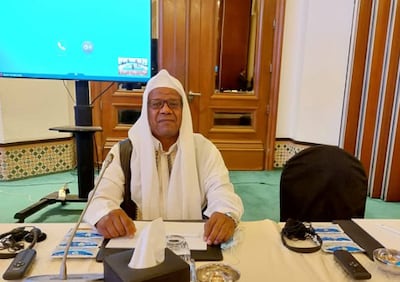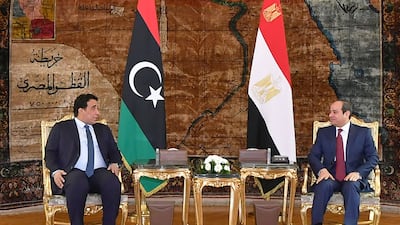The Egyptian capital Cairo is playing host to a new round of talks aimed at finding a solution to a political limbo in Libya, which could divide its institutions once again and lead to instability.
The UN-sponsored talks involve two delegations representing the parliament, which backs a new prime minister, and the High Council of State (HCS), which is against removing the incumbent whose mandate expired in December.
“The dialogue will kick off today after being delayed over the past few days,” Abdel Qadir Al Hewili, a senior member of the HCS, told The National from Cairo.
"This is progress in itself towards a solution to the political crisis, but the country isn’t out of the woods yet and this progress hangs by a fraying thread."
While the HSC is an advisory body to the government and the House of Representatives, it can express a binding opinion on these bodies under certain circumstances.
“Libya’s political crisis is deeply rooted in a legislative dilemma," Mr Al Hewili said. "The problem isn’t about a certain government, it has everything to do with the legitimacy of the government as the legislators sharply disagree over this point in particular.”
The UN is seeking to resolve the crisis by pushing for new elections soon and has asked political and legislative bodies to set up a joint committee to resolve constitutional and legal disputes that played a big role in cancelling what would have been the country’s first presidential election in December.

This has created a crisis in the North African country as politicians have argued over the control of executive power and triggered a new phase of political polarisation.
If unresolved, the dispute threatens to reverse the gains achieved over the past two years, when two parallel governments agreed in UN-sponsored talks to end years of civil war and chaos after a Nato-backed uprising against Muammar Qaddafi in 2011.
As the efforts failed in December to reunify the country, the parliament declared null the interim unity government that was meant to oversee the run-up to elections, and appointed Fathi Bashagha as the new prime minister.
The unity government's Prime Minister Abdul Hamid Dbeibah has refused to cede power. Armed factions of each side have mobilised in and around the capital.
The UN secretary general's special adviser on Libya, Stephanie Williams, will attend the Cairo talks, which are expected to last for several days.
In February, Ms Williams told The National that Libya must press ahead with free and fair elections otherwise a national disaster with no end in sight could ensue.
She said all of Libya's institutions suffer from a crisis of popular legitimacy, which can only be solved through the ballot box.


